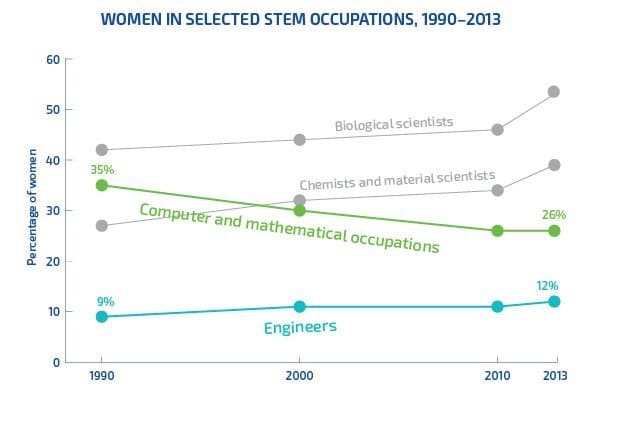Did you know that the number of women in tech has decreased substantially over the last 30 years? I didn’t, until recently. We all know that the percentage of women in tech is horribly out of whack, because we’ve read 100 articles just like this one. But, gender diversity worsening? How is that possible when I’ve grown up into, and in love with tech over that same time?

Searchspring and Women Talk Tech recently hosted a Toronto Women in Tech meetup where we discussed this exact question. I was honored to sit on a panel alongside two incredibly thoughtful people, both of whom I respect on this topic. This article is going to recount that panel, but from a perspective that you don’t often get. Rather than recap everything that happened at the event, I’ll tell you what was actually going through my head while I was calculating a debatably intelligent response to a single question.
Why is gender diversity in tech an issue worth discussing?
“Why do you think the issue of gender diversity in tech is so important for us to address?” Marie Wiese’s question flew over my head toward Will. Will Warren is Searchspring’s CTO. On this panel, Will was sitting to my left, the crowd’s right, which was helpful because he is tall and would have blocked my line of sight to Marie, our moderator and the Host of Women Talk Tech Podcast, if I had been stuck on the end of the row. Vicki Bradley, Founder & CEO of Women in Leadership Empowered completed the panel line-up.
“You mentioned that the percentage of women in tech has declined over the past 30 years. What I’ve read, and correct me if I’m wrong…” Will speaks in a British accent that teeters carefully between brutal confidence and endearing self-deprecation, so I’m sure that whatever comes next will be accepted as fact among listeners. “Toy companies.”
Sure. Blame the marketers. I expected more from you, Will.
Will continues, “We used to have incredible female role models in technology.” (I’m paraphrasing). “Then, toy companies decided that computers were for boys.”
Damn. He’s probably right.
Let me stop here and tell you what was happening in my life while toy companies were marketing computers to boys, because you can’t see all of the memories that flashed through my mind as Will was talking.
In 1995, my grandparents bought my first computer. I honestly couldn’t tell you what it was, but it had Windows ‘95 installed and I put some serious mileage on Corel Draw. Before that, I attended class where we studied (read: played Oregon Trail) on a Macintosh Quadra 700. And, before that, I’d visit my great grandmother in her Florida condo, get sugar-drunk on Yoo-hoo, and play Paratrooper for hours on her IBM PC5150. If you haven’t played Paratrooper on DOS, you haven’t lived.
No one ever told me that computers were for boys.
But…
“You know, I can see what Will’s saying.” That’s me talking. I started talking, out loud, because my entire life story that was counter to his point led to a conversation I recently had with my daughter. “We gave my son a Raspberry Pi when he was 4 and he loved Scratch the Cat. But, Scratch the Cat isn’t pink, or fluffy, or a unicorn. It hasn’t quite taken hold with my daughter.”
My daughter loves pink, fluffy, unicorns. She’s 5, but let’s be honest we all love unicorns. It’s not that Scratch the Cat is for boys, it’s that the marketers for LOL Dolls spend millions of dollars to capture a significant portion of my daughter’s mindshare. It’s not that she’s not interested, it’s that she’s not the most interested in technology. At least not in creating it.
As a kid, I saw a computer as an outlet to create or engage. Corel Draw: I was making newsletters for my neighborhood. Paratrooper: Sugar coma with my great grandmother. An eventual Compaq Desk Pro 2000: dismantling it into a million pieces to a) install a CD-R drive and b) see how it works in there. So, I was the most interested. I was hooked.
So why aren’t there more women in tech?
We all know there are a lot of factors. A few of my new theories after this event? Mindshare and branding. I know, spoken like a true marketer.
Mindshare – People have a lot on their minds. It’s not about going from 0-16 in terms of interest, it’s about making technology the most interesting. That starts with companies who invest in actual innovation and opportunities to grow.
Branding – I spoke with a Brainstation student after the panel (Hi, Amanda!) who said, “If someone had told me that working in technology meant just figuring out how things work and creating, I would have been more interested in it sooner.”
What do we do with this?
I’m excited about our initiative at Searchspring to make technology a more balanced and diverse industry. That starts with hiring amazing people who will contribute to an equitable and diverse culture, so if you’re into tech like we are, take a look at our open positions.
I also want to hear about the cool things other people, groups, and companies are doing to foster diversity. Reach out and share some great ideas!

